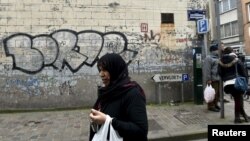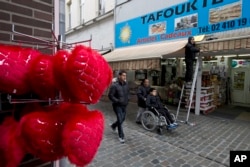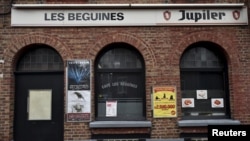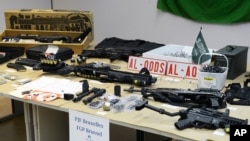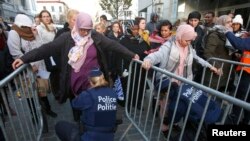The Brussels neighborhood of Molenbeek was little known to the world just a year ago. But after the Paris attacks on November 13 and the bombings in Brussels on March 22, the name of the neighborhood has become synonymous with Europe's problem of home-grown Islamic terrorism.
The reason: in both the Paris and Brussels attacks, the trail leads back to this dilapidated neighborhood of some 95,000 people just minutes from the center of the Belgian capital.
At least three of the Paris attackers came from Molenbeek and one of them, alleged mastermind Salah Abdeslam, successfully hid in the neighborhood for months before being captured on March 18. The brothers named by police as suicide bombers in the Brussels attacks, Khalid and Ibrahim el-Bakraoui, also have links to Abdeslam and his Molenbeek-based network.
How did Molenbeek became a center for militant Islamic extremists in Europe and what lessons does it teach about fighting radicalism? Here are five things to consider.
Alienation
Molenbeek may be just a few minutes commute from prosperous downtown Brussels but this former canal area district is filled with rundown, cheap housing that for decades has made parts of it a magnet for mostly North African migrants. In some quarters the population is 80 percent Muslim and unemployment is 30 percent overall, rising to almost 40 percent among the young.
If previous generations of migrants found plenty of low-skilled jobs in Belgium's car factories and coal mines, the country's move over recent years from an industry-based to a service-based economy has left their children with far narrower employment opportunities.
"There are no factories, no jobs -- except for those who speak both French and Dutch or have a university degree -- and 60 percent of these young people with a Muslim background do not have a degree and do not speak Dutch," Bilal Benyaich, a Belgian who has written extensively on radicalism, extremism, and terrorism, was quoted as saying by Foreign Policy magazine after the Paris attacks in November.
He has said that the problem of alienation in Molenbeek also stems in part from Belgium's decision in the 1970s to allow preachers trained in Gulf Arab states to teach in local mosques as Brussels sought favorable oil deals with Saudi Arabia.
The Salafist preachers promoted a more radical form of Sunni Islam than the one usually practiced in the Maghreb but whose message resonated with the frustration felt by young people unable to integrate into Belgian society. The preachers "had a major influence on several generations of young people born in Belgium to a Muslim background," Al-Jazeera quoted Benyaich as saying, also in November.
The proof may be in the Paris and Brussels attacks, both claimed by the extremist group Islamic State. The extremist Salafist organization is reported to recruit heavily among radicalized young Muslims in Molenbeek and other areas of Belgium.
Per capita, more fighters in Syria have come from Belgium than from any other European Union country, and more than 300 Belgians have gone to Syria and Iraq, according to the Brussels-based Egmont think tank.
Criminal Gangs And Extremism
One of the lessons of Molenbeek is that Islamic extremism has particular attraction to marginalized individuals already engaged in criminal activities.
Belgian federal prosecutor Frederic Van Leeuw said on March 23 that the Bakraoui brothers "had a heavy criminal record not linked to terrorism."
Abdeslam ran a bar in Molenbeek that was shut on suspicion of being a hub for drug dealing.
"Because of the difficulty of fitting into a hostile society, they look for alternative networks where they can blend in," says Rik Coolsaet, a senior associate fellow at Egmont. That suggests that both criminal gangs and terrorist networks offer the sense of belonging that marginalized individuals seek.
But belonging to criminal groups also gives terrorists a valuable asset: a network of cronies who are unknown to the police as militants and who can hide them in safe houses.
Abdeslam used just this system to go underground as police across Europe searched for him following the Paris attacks. While some believed he had been spirited out of Europe by Islamic State extremists to Syria or elsewhere, it now appears to he was hiding in Molenbeek the whole time.
"Abdeslam relied on a large network of friends and relatives that already existed for drug dealing and petty crime to keep him in hiding," Van Leeuw said on March 20. "This was about the solidarity of neighbors, families."
But such reliance on secret networks of contacts also suggests that the militants cannot count on any wider community support than close associates in Molenbeek to shield them from police. Many Molenbeek residents are aghast at the Paris and Brussels attacks, have condemned them, and say they reject any linking of terrorism to their neighborhood.
Black-Market Weapons
Another factor that may contribute to the growth of terror networks in Molenbeek is easy access to weapons.
Experts believe many of the assault rifles used in the Paris attacks, which killed 130 people, were purchased illegally in Belgium.
"Over the last five to 10 years, the fact is that Brussels has become known for a large black market in illegal weaponry and an illegal arms trade," says Leo Neels, director of the Itinera Institute think tank in Brussels. "For terrorist fighters willing to commit an attack, it is rather easy to find the way."
Belgium has a history of lax gun laws that enabled purchasers until 2006 to buy a gun simply by showing an identification card. Restrictions tightened that year after a far-right extremist went on a shooting rampage in Antwerp but by then Belgium's reputation as a weapons market was already well established.
Belgian police try to crack down on the illegal arms trade, whose major source is the Balkans. But they have the same challenges in stamping it out that they do with eliminating the illegal drug trade.
Intelligence Challenges
Yet another reason terrorism networks have found it easy to take root in Brussels is sparsely staffed intelligence services.
Belgium's intelligence agency is reported to have just 600 staff members, a third as many in the Netherlands next door. Belgium also has tight rules on how the agency operates, including a law banning house raids at night.
"It is true that the Belgian security services have been and still are to some extent underfunded," says Dave Sinardet, a professor of political science at The Free University of Brussels. "It is also true that the political focus and political energy has not always been very strongly oriented toward security challenges."
He says that public debate in Belgium has frequently focused on the political problems of governing a country that is divided into three communities with substantial self-rule: a Dutch-speaking Flemish region, a French-speaking region, and a German-speaking region.
"We spent years and years focused mostly on internal institutional questions and linguistic issues between Flemings and Francophones and all this time could have been devoted to reforming security policies, but the focus was elsewhere," Sinardet says.
Falling Through The Cracks
Nowhere is Belgium's decentralized state more visible than in Brussels, the officially bilingual capital. And that extreme decentralization may help account for how a neighborhood like Molenbeek could become home to more and more radicalized individuals over time without causing more alarm.
Brussels is divided into 19 communes, each with its own mayor. It also is divided into six police zones, each with its own police superintendent.
The result is a duplication of bureaucracies that observers say obstructs the sharing of information.
The New York Times recently listed some of the prices Brussels pays. Among them are an inadequate security apparatus for monitoring Molenbeek, an inadequate system for tracking people moving to and from Brussels, and divisions between federal agencies along linguistic and cultural lines that complicate conducting investigations.




